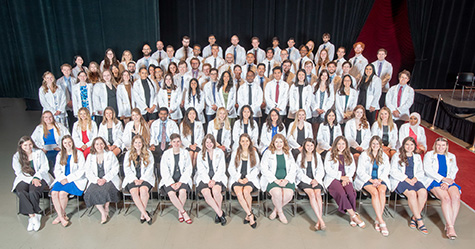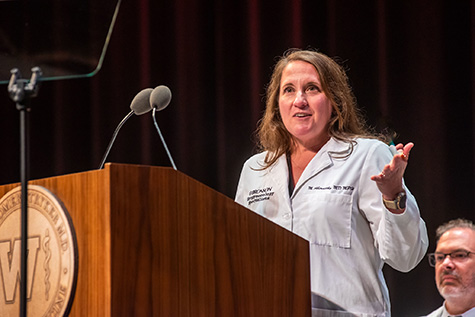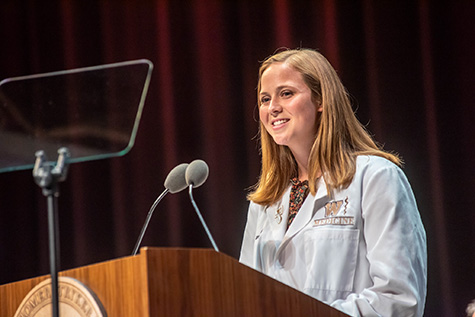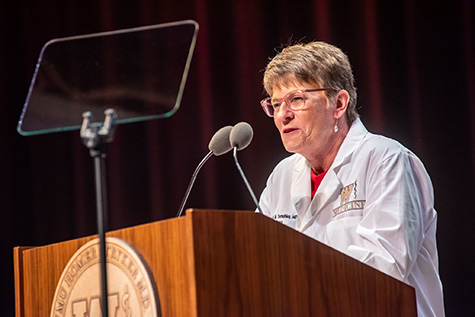
As she looked out at students from the MD Class of 2027 during the White Coat Ceremony, Melinda Abernethy, MD, MPH, welcomed the future physicians to “the inside circle of medicine.”
Then, she gave them a dose of reality.
“Now that you’re one of us … I will let you in on a little secret,” said Dr. Abernethy, a clinical associate professor in the Department of Obstetrics and Gynecology who served as the keynote speaker for this year’s White Coat Ceremony. “The absolute hardest part of medical school and practicing medicine in general is staying grounded, remembering who you are, and why you are here. At times, you’re going to feel stressed and tired, and really, really hungry.
“This leaves little space for grounding and this, I believe, leads to a very real risk of burnout,” she added. “The solution, I think, is in the essence of who we are and who our profession serves – complex and beautiful, and imperfect humans.”

As reassurance, Dr. Abernethy told the students about her own journey into the field of medicine, how her anger with the profession following her father’s cancer diagnosis and death eventually led her to give up majoring in anthropology to pursue her MD degree. She was inspired, in part, she said, by Melvin Konner, MD, PhD, who wrote an ethnographic study of medical school titled, “Becoming a Doctor.”
“In his book, he states, ‘At the conclusion of all our studies, we must try once again to experience the human soul as soul and not just as a buzz of bioelectricity. The human will as will and not just as surge of hormones. The human heart … as the metaphoric organ of understanding. We must stand in awe of them as unassailable even though they are dissected before our eyes,’” Dr. Abernethy said.
This year’s White Coat Ceremony was held on Friday, September 8, at WMU’s Miller Auditorium. The event was also livestreamed, allowing family members and friends who could not attend in-person to tune in to the festivities.

In addition to Dr. Abernethy, the 84 students from the Class of 2027 heard remarks from WMed Dean Paula M. Termuhlen, MD, and M2 Caroline Hall, among others, during the ceremony.
Hall reflected on her first year at WMed and tried to provide a few insights to the medical school’s newest students. For inspiration, she leaned on a speech the late Jimmy Valvano gave at the 1993 ESPYs weeks before he died of cancer.
“If you laugh, you think, and you cry, that’s a full day,” Hall said, recalling Valvano’s words. “That’s a heck of a day. You do that seven days a week and you’re going to have something special.
“Your first year of medical school will undoubtedly be full of full days,” Hall added. “The fullness of this first year – the laughing, the thinking, and even the crying – is what makes it so special … Today, I challenge you to embrace the fullness of the opportunity before you while actively taking care of yourself and of each other. As you continue with this first year, nourish the camaraderie that defines the WMed community. Rest assured your fellow students stand beside you ready to support you each step of the way.”
The white coat for each student at the White Coat Ceremony was made possible by contributions from white coat sponsors. Each student received a hand-written note from their sponsor that was placed in the pocket of their white coat for them to read.

Dr. Termuhlen told students that the privilege of wearing their white coats is steeped in tradition and symbolism.
“Accordingly, wearing a white coat is not only an expectation but a privilege,” she said. “Today’s ceremony is more than a ritual. You are pledging to follow the oath that you recite today during your career as a physician. Your role as a physician has already begun as you are now learning the science of medicine and how to practice the art of patient care. A physician must care as well as cure.
“As a physician you are obligated to demonstrate excellence in the master of scientific knowledge, to be compassionate, and to embody integrity, professionalism, and lifelong learning,” she added.
As the White Coat Ceremony concluded, the students recited their class oath, which they wrote collectively. The oath serves as a code of conduct throughout their time at WMed and as physicians after graduation.
As she closed out her remarks to the Class of 2027, Dr. Abernethy told the students that as she weighed whether to give up anthropology for the pursuit of her MD degree, she reached out to Dr. Konner for advice. She received a handwritten letter in response to her query.
“He said that both fields were incredible, and both have the opportunity to study humans,” she said. “He said the difference, though, is that anthropology focused on how others have influenced us and medicine on how we can influence others. I tell this story because it’s how I remind myself of who I am, why I’m here.
“I remember that medicine is not a technical vocation but a profession in which one human is taking care of another with all the complexities and limitations this can create,” she added. “Humans are fallible, limited, but for the most part we’re all just trying our best. As you receive your white coat today and continue your journey in medicine, I hope you can each recall upon your own stories. I also encourage you to continue writing them, to see each patient as having their own story. Medical school is a lot of work. You spend the first two years learning a lot … and then you have to somehow remember these basic sciences without seeing the patient as just an organ in disarray, a receptor out of whack, or a complex disease process. You have to remember the humanity in medicine.”
